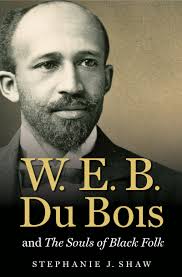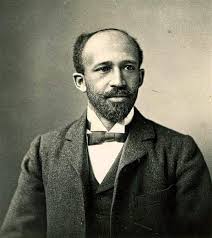The Souls of Black Folk Page #28
The Souls of Black Folk is a 1903 work of American literature by W. E. B. Du Bois. It is a seminal work in the history of sociology and a cornerstone of African-American literature. The book contains several essays on race, some of which the magazine Atlantic Monthly had previously published.
It is a land of rapid contrasts and of curiously mingled hope and pain. Here sits a pretty blue-eyed quadroon hiding her bare feet; she was married only last week, and yonder in the field is her dark young husband, hoeing to support her, at thirty cents a day without board. Across the way is Gatesby, brown and tall, lord of two thousand acres shrewdly won and held. There is a store conducted by his black son, a blacksmith shop, and a ginnery. Five miles below here is a town owned and controlled by one white New Englander. He owns almost a Rhode Island county, with thousands of acres and hundreds of black laborers. Their cabins look better than most, and the farm, with machinery and fertilizers, is much more business-like than any in the county, although the manager drives hard bargains in wages. When now we turn and look five miles above, there on the edge of town are five houses of prostitutes,—two of blacks and three of whites; and in one of the houses of the whites a worthless black boy was harbored too openly two years ago; so he was hanged for rape. And here, too, is the high whitewashed fence of the “stockade,” as the county prison is called; the white folks say it is ever full of black criminals,—the black folks say that only colored boys are sent to jail, and they not because they are guilty, but because the State needs criminals to eke out its income by their forced labor. Immigrants are heirs of the slave baron in Dougherty; and as we ride westward, by wide stretching cornfields and stubby orchards of peach and pear, we see on all sides within the circle of dark forest a Land of Canaan. Here and there are tales of projects for money-getting, born in the swift days of Reconstruction,—‘improvement’ companies, wine companies, mills and factories; most failed, and foreigners fell heir. It is a beautiful land, this Dougherty, west of the Flint. The forests are wonderful, the solemn pines have disappeared, and this is the “Oakey Woods,” with its wealth of hickories, beeches, oaks and palmettos. But a pall of debt hangs over the beautiful land; the merchants are in debt to the wholesalers, the planters are in debt to the merchants, the tenants owe the planters, and laborers bow and bend beneath the burden of it all. Here and there a man has raised his head above these murky waters. We passed one fenced stock-farm with grass and grazing cattle, that looked very home-like after endless corn and cotton. Here and there are black free-holders: there is the gaunt dull-black Jackson, with his hundred acres. “I says, ‘Look up! If you don’t look up you can’t get up,’” remarks Jackson, philosophically. And he’s gotten up. Dark Carter’s neat barns would do credit to New England. His master helped him to get a start, but when the black man died last fall the master’s sons immediately laid claim to the estate. “And them white folks will get it, too,” said my yellow gossip. I turn from these well-tended acres with a comfortable feeling that the Negro is rising. Even then, however, the fields, as we proceed, begin to redden and the trees disappear. Rows of old cabins appear filled with renters and laborers,—cheerless, bare, and dirty, for the most part, although here and there the very age and decay makes the scene picturesque. A young black fellow greets us. He is twenty-two, and just married. Until last year he had good luck renting; then cotton fell, and the sheriff seized and sold all he had. So he moved here, where the rent is higher, the land poorer, and the owner inflexible; he rents a forty-dollar mule for twenty dollars a year. Poor lad!—a slave at twenty-two. This plantation, owned now by a foreigner, was a part of the famous Bolton estate. After the war it was for many years worked by gangs of Negro convicts,—and black convicts then were even more plentiful than now; it was a way of making Negroes work, and the question of guilt was a minor one. Hard tales of cruelty and mistreatment of the chained freemen are told, but the county authorities were deaf until the free-labor market was nearly ruined by wholesale migration. Then they took the convicts from the plantations, but not until one of the fairest regions of the “Oakey Woods” had been ruined and ravished into a red waste, out of which only a Yankee or an immigrant could squeeze more blood from debt-cursed tenants. No wonder that Luke Black, slow, dull, and discouraged, shuffles to our carriage and talks hopelessly. Why should he strive? Every year finds him deeper in debt. How strange that Georgia, the world-heralded refuge of poor debtors, should bind her own to sloth and misfortune as ruthlessly as ever England did! The poor land groans with its birth-pains, and brings forth scarcely a hundred pounds of cotton to the acre, where fifty years ago it yielded eight times as much. Of his meagre yield the tenant pays from a quarter to a third in rent, and most of the rest in interest on food and supplies bought on credit. Twenty years yonder sunken-cheeked, old black man has labored under that system, and now, turned day-laborer, is supporting his wife and boarding himself on his wages of a dollar and a half a week, received only part of the year. The Bolton convict farm formerly included the neighboring plantation. Here it was that the convicts were lodged in the great log prison still standing. A dismal place it still remains, with rows of ugly huts filled with surly ignorant tenants. “What rent do you pay here?” I inquired. “I don’t know,—what is it, Sam?” “All we make,” answered Sam. It is a depressing place,—bare, unshaded, with no charm of past association, only a memory of forced human toil,—now, then, and before the war. They are not happy, these black men whom we meet throughout this region. There is little of the joyous abandon and playfulness which we are wont to associate with the plantation Negro. At best, the natural good-nature is edged with complaint or has changed into sullenness and gloom. And now and then it blazes forth in veiled but hot anger. I remember one big red-eyed black whom we met by the roadside. Forty-five years he had labored on this farm, beginning with nothing, and still having nothing. To be sure, he had given four children a common-school training, and perhaps if the new fence-law had not allowed unfenced crops in West Dougherty he might have raised a little stock and kept ahead. As it is, he is hopelessly in debt, disappointed, and embittered. He stopped us to inquire after the black boy in Albany, whom it was said a policeman had shot and killed for loud talking on the sidewalk. And then he said slowly: “Let a white man touch me, and he dies; I don’t boast this,—I don’t say it around loud, or before the children,—but I mean it. I’ve seen them whip my father and my old mother in them cotton-rows till the blood ran; by—” and we passed on.
Translation
Translate and read this book in other languages:
Select another language:
- - Select -
- 简体中文 (Chinese - Simplified)
- 繁體中文 (Chinese - Traditional)
- Español (Spanish)
- Esperanto (Esperanto)
- 日本語 (Japanese)
- Português (Portuguese)
- Deutsch (German)
- العربية (Arabic)
- Français (French)
- Русский (Russian)
- ಕನ್ನಡ (Kannada)
- 한국어 (Korean)
- עברית (Hebrew)
- Gaeilge (Irish)
- Українська (Ukrainian)
- اردو (Urdu)
- Magyar (Hungarian)
- मानक हिन्दी (Hindi)
- Indonesia (Indonesian)
- Italiano (Italian)
- தமிழ் (Tamil)
- Türkçe (Turkish)
- తెలుగు (Telugu)
- ภาษาไทย (Thai)
- Tiếng Việt (Vietnamese)
- Čeština (Czech)
- Polski (Polish)
- Bahasa Indonesia (Indonesian)
- Românește (Romanian)
- Nederlands (Dutch)
- Ελληνικά (Greek)
- Latinum (Latin)
- Svenska (Swedish)
- Dansk (Danish)
- Suomi (Finnish)
- فارسی (Persian)
- ייִדיש (Yiddish)
- հայերեն (Armenian)
- Norsk (Norwegian)
- English (English)
Citation
Use the citation below to add this book to your bibliography:
Style:MLAChicagoAPA
"The Souls of Black Folk Books." Literature.com. STANDS4 LLC, 2025. Web. 10 Jan. 2025. <https://www.literature.com/book/the_souls_of_black_folk_310>.




Discuss this The Souls of Black Folk book with the community:
Report Comment
We're doing our best to make sure our content is useful, accurate and safe.
If by any chance you spot an inappropriate comment while navigating through our website please use this form to let us know, and we'll take care of it shortly.
Attachment
You need to be logged in to favorite.
Log In